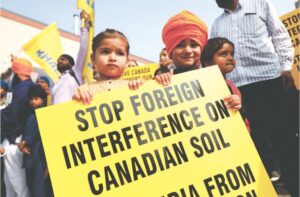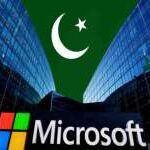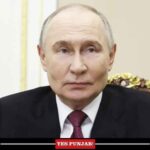 MOON Desk: In the process, to borrow a phrase from Shekhar Gupta of The Print, Canada has been transformed in India, into the ‘new Pakistan’ or even a Pakistan Plus — responsible for everything from aiding terrorism and harbouring criminals to supporting organised crime. What a transformation!
MOON Desk: In the process, to borrow a phrase from Shekhar Gupta of The Print, Canada has been transformed in India, into the ‘new Pakistan’ or even a Pakistan Plus — responsible for everything from aiding terrorism and harbouring criminals to supporting organised crime. What a transformation!
But at home, it seems that Canadians stand united on the issue. Such a killing is ‘entirely unacceptable’, was the loud message from the House of Commons.
Immediately after the announcement by Trudeau, the leader of the opposition in the House, Pierre Poilievre of the Conservative Party, in a calibrated statement called on parliament to “put aside our differences, to stand up for the rule of law. If these allegations are true, these represent an outrageous affront to Canada’s sovereignty, he underlined.
Poilievre’s statement was significant. The previous Conservative government in Canada under Prime Minister Stephen Harper had pursued strong bilateral relations with India. Under his leadership, ties between the two countries blossomed and Poilievre was twice a cabinet member in the Harper government.
Like a true son, Trudeau is following on the footsteps of his father, Pierre Trudeau, who harboured similar misgivings against India. It is well known how in 1982 Prime Minister Pierre Trudeau turned down a request by Prime Minister Indira Gandhi’s government for extradition of Talwinder Singh Parmar, a pro-Khalistan Babbar
Khalsa activist, wanted for killing two Punjab policemen at the height of terrorism in Punjab. Three years later, in June 1985, Parmar was involved in the horrific mid-air explosion of an Air India B747 aircraft while en route from Montreal to New Delhi. All 329 on board, 268 of them Canadian citizens, perished as the aircraft’s wreckage plunged into the icy waters of the Atlantic Ocean.
Yet, it cut little ice with the Canadian authorities who remained economical in their investigation. So much for their belief in the “rule of law”.
An emboldened Parmar then began advocating the killing of 50,000 members of a particular community and threatened to make more Indian aircraft disappear from the sky. All this was permitted under the “right to free speech and expression” by a supposedly friendly country with shared values.
It is also not for the first time that Canada and India have expelled each other’s high commission staff. In his book, “Open Secrets”, M.K. Dhar, a former Intelligence Bureau officer once posted in the Indian High Commission in Ottawa, brings out how the Canadian government declared some RAW officials posted in the Indian High Commission in Ottawa and in the Indian consulates in Toronto and Vancouver as persona non grata during the 1980s when terrorism was its height in Punjab. Except that this was then done discreetly.
Over the years, ever since Sikhs from Punjab have numerically reached a critical mass in Canada, some Canadian political parties have increasingly begun playing sectarian vote bank politics, a malaise that is otherwise well entrenched in the Indian political system. Except that this has come at a huge cost to bilateral relations.
The expression of “concern” by the US and Australian governments comes from their longstanding relations with Canada as WASP (White Anglo-Saxon Protestant) nations and from being members of both the Echelon (a five-member Intelligence sharing group) and NATO. But as of now the West have publicly paid lip service to the Canadians and been discreet in their communication with India on this matter.





